Sisters in Service During World War I
Posted on June 28, 2018, by Loretto Community
By Laurel Wilson
A row of white tents lined the campus of Loretto Heights Academy in Denver during July 1917. For three weeks, the Heights was transformed into the National Service School, a camp started by the Woman’s Section of the Navy League that trained women in service skills needed during wartime and national disasters.
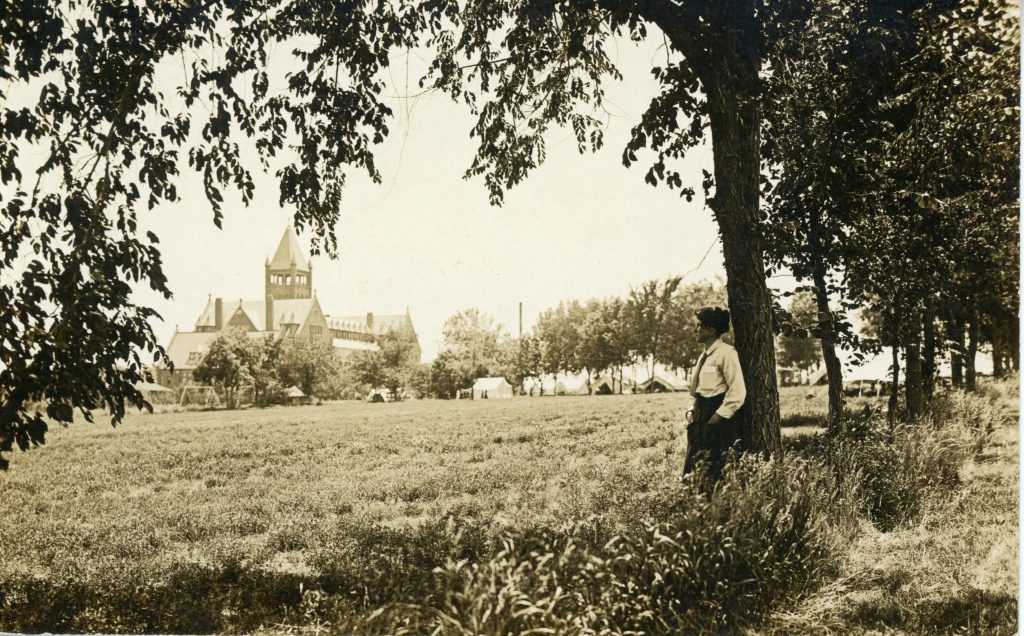
Allowing the National Service School to use the Heights campus was just one of many ways Sisters of Loretto served during World War I and its aftermath. The sisters’ wartime activities are well documented because Sr. Antonella Hardy SL, who served as Loretto’s archivist at the time, wrote to sisters asking them to report what they and their schools did for the war effort. Among the ways the Loretto Community contributed were by sending clothes, medical supplies, and Catholic items such as prayer books, rosaries, and scapulars. They also bought liberty bonds and raised money for relief efforts.
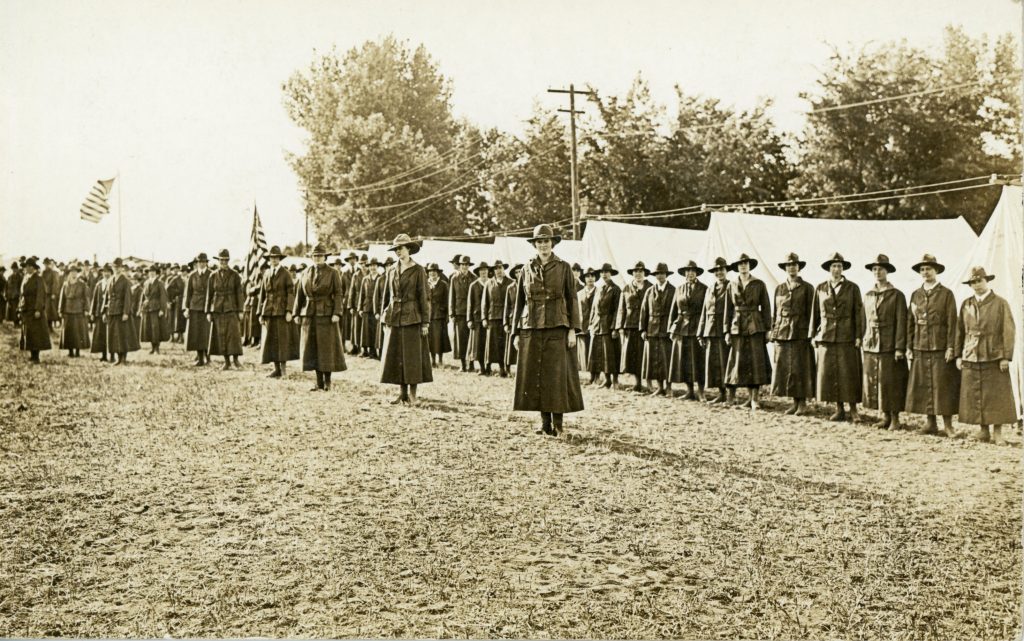
Camp Taylor
But some sisters were called to do much more. Twenty Sisters of Loretto were sent to nurse victims of the largest influenza pandemic in history, which spread rapidly worldwide because of troop movements during the final weeks of the war. At the time, Camp Zachary Taylor in Louisville was the largest U.S. Army Training camp in the country, with 40,000-64,000 soldiers. By the end of September 1918, nearly 20 percent of the troops had fallen ill. Because few health care professionals remained on the home front, the base hospital could not adequately care for the thousands of sick soldiers. Requests for volunteer nurses published in Louisville newspapers came to no avail, so the Catholic Army chaplain at the base called on six orders of Kentucky nuns to help.[1]
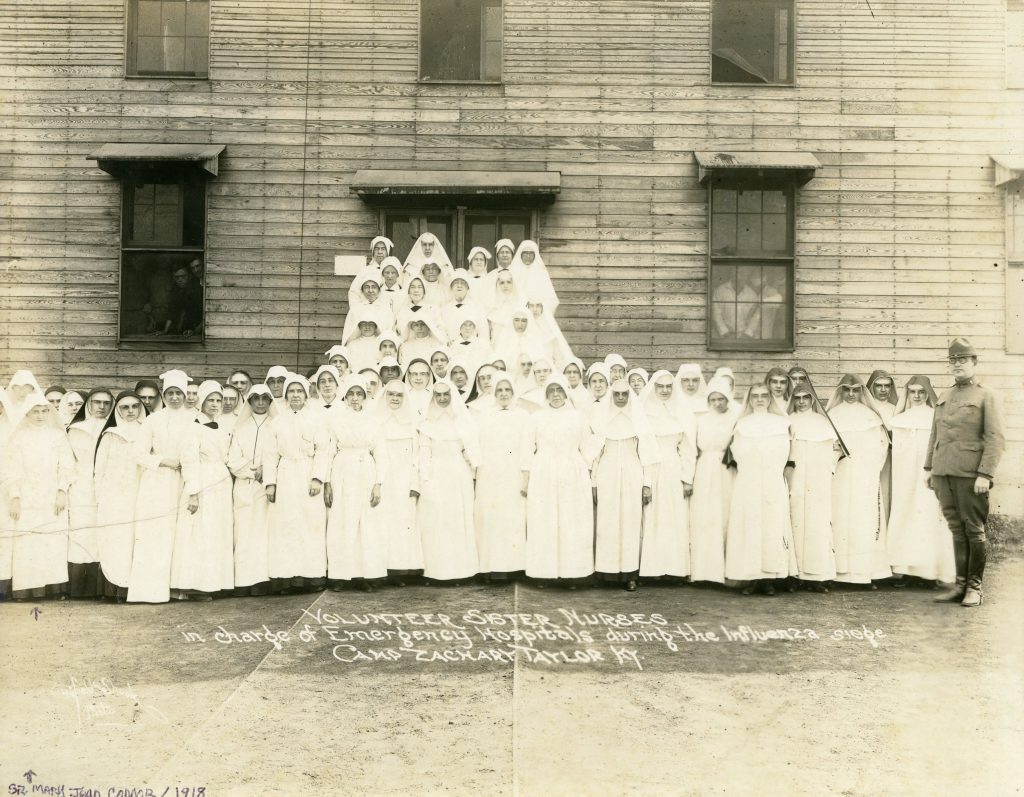
There was “much excitement” when Mother Superior Praxedes Carty received a call on October 8, 1918 asking for sisters to serve as nurses at Camp Taylor, according to the Motherhouse annals. “Of course Reverend Mother responded generously, explaining however, that we were teachers, not nurses by profession and on consequence our services could not be efficient, and she was told that so great was the emergency they would be glad to get the help of anyone who could give a glass of water or render some such attention, that Red Cross nurses were on hand to give instruction as to what to do.”
Three days later, 12 Sisters of Loretto set out for duty at the camp. They took the Novices’ white veils and long white aprons with sleeves to use as their nurses uniforms. The sisters looked after soldiers for about a month, performing duties such as taking vitals, dispensing medicine, cleaning wounds, writing letters to soldiers’ families, and generally providing for their comfort.
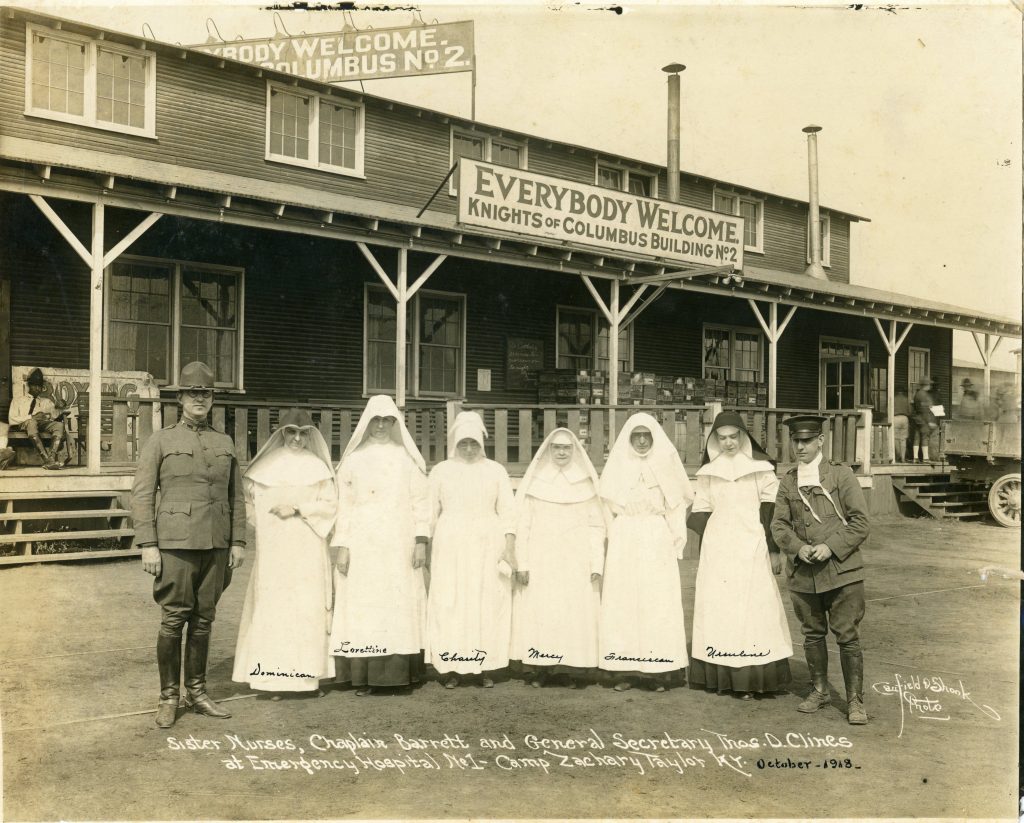
“Many stories of courage come from the battlefield, but stories no less thrilling could be written of those who died at home of the ‘flu,’ during those never-to-be-forgotten days.”
Sister Marcella Ricketts SL in her account of the experience
Sister Mary Carmel Smith SL recounted a memorable moment during her service: “One afternoon I secured the wherewith to make three large water-buckets full of egg-nog, this quantity allowing each man one glassful. Though the one thing needful was ‘conspicuous by its absence,’ it was good to hear the poor lads smack their lips with satisfaction. I was inwardly amused and wondering why there were no comments, when suddenly one boy looked up and, with a mischievous twinkle in his eye, said, ‘Nurse, you forgot to put the kick in this, didn’t you?’ to which I replied, ‘Oh, don’t you know this is a prohibition area?’“
Eastern Kentucky mining camps
A couple of weeks after sending the group of sisters to Camp Taylor, Mother Praxedes got another call asking for volunteer nurses, this time to the mining communities of Eastern Kentucky, which had been hit hard with the flu epidemic. On October 28, 8 Sisters of Loretto were sent to help mining families affected by the epidemic.
Sister Mary Gabriel Berry SL, who was serving at Marrowbone Mining Company in Pikeville, wrote to Mother Praxedes: “The condition of this mine is very serious. For miles all of these mines have had to close down and the fires in the coke ovens have gone out. This is a heavy loss to the country. Nearly every family in the whole camp is down sick, not able even to get a drink of water. After the men get over the influenza they are so weak they cannot work. For the last three weeks they have had about six deaths a day. “
Sisters in Eastern Kentucky found “not a sign of a Catholic anywhere.” Many families they helped had never heard of nuns nor met a Catholic priest, and some had anti-Catholic views. However, the sisters were treated with respect and gratitude, and they helped changed many people’s minds about Catholics.
Mary Gabriel wrote: “The distress by which we were surrounded had to be seen to be realized. Anything I might say would give you but a faint idea of the poverty, suffering, and distress. My greatest sorrow is that in all that section there are no Sisters, no priests, no Catholic churches- and how the Catholic religion is hated! I have not words to express it. But our going among them on our errand of mercy wrought a change; many of them said to us, ‘We will never again believe such tales and terrible things about Catholics; for a religious that can produce such self-sacrificing women must be good and true.’ “
During their time nursing the sick, 4 Sisters of Loretto became ill with the flu. Sister Mary Jean Connor SL, who had not yet made final vows, died from the flu on October 28. She was given a military funeral at Camp Taylor before being brought to Loretto for interment.
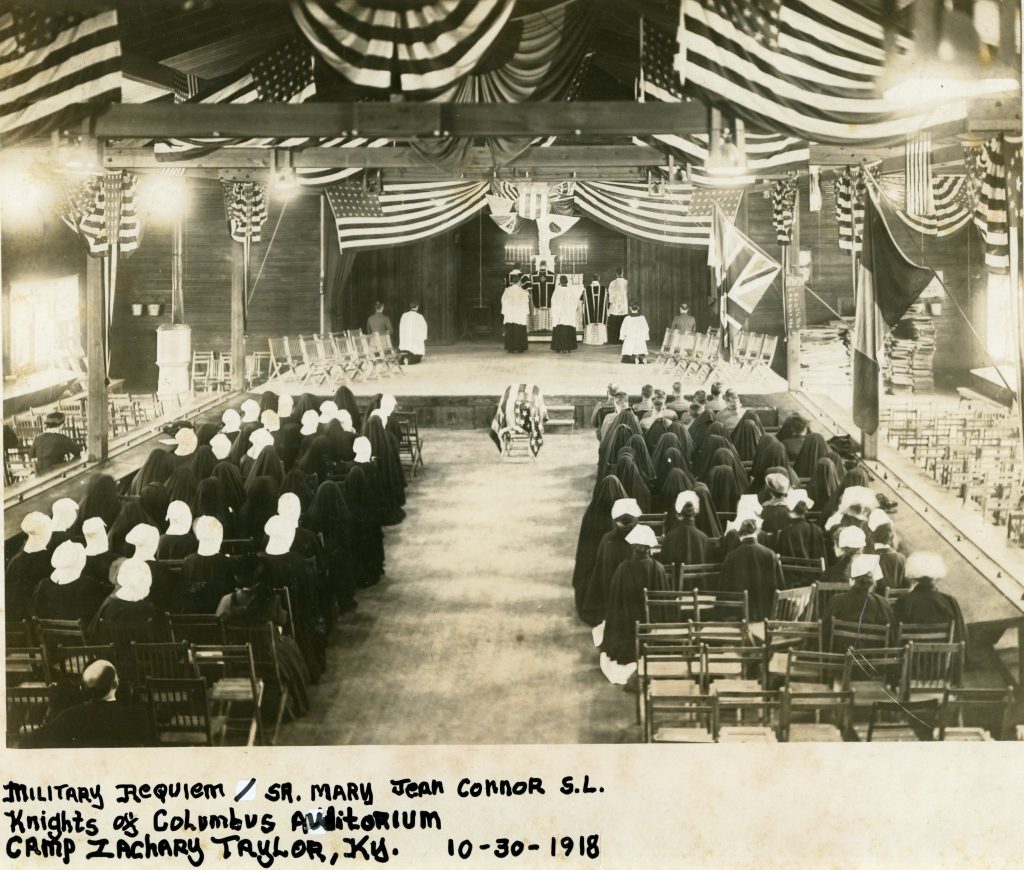
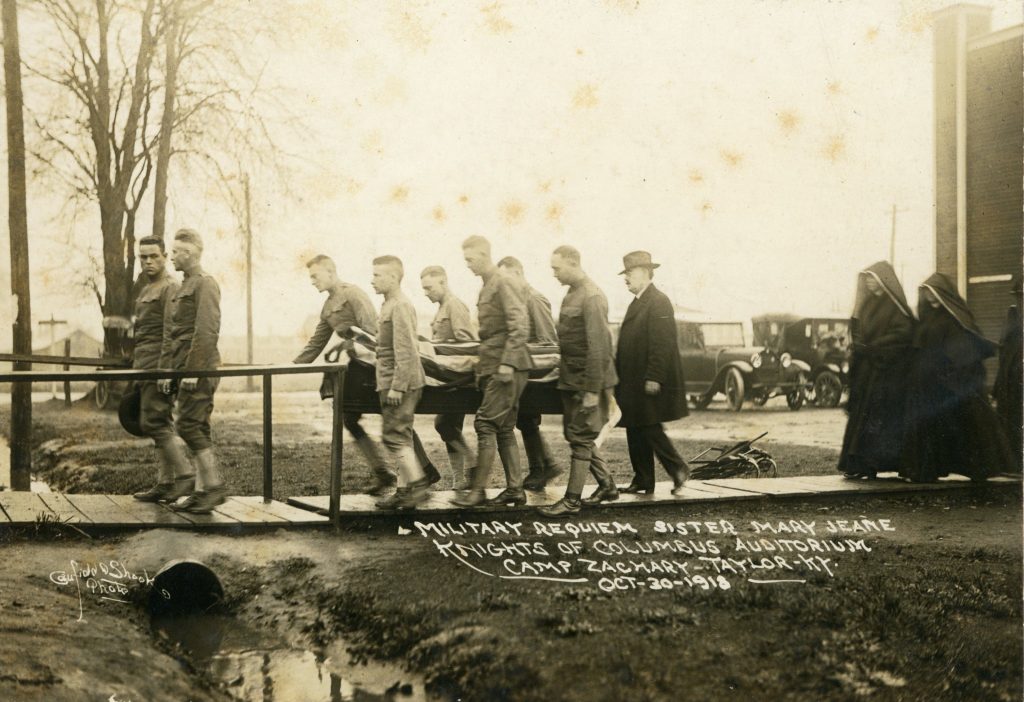
List of Sisters of Loretto Who Nursed Flu Victims
Sisters at Camp Taylor:
- Sister M. Assumpta McIntosh
- Sister Mary Carmel Smith
- Sister Mary Patricia Hughes
- Sister Mary Jean Connor
- Sister Mary Liberata Sanchez
- Sister M. Marcella Ricketts
- Sister M. Bonaventure Mudd
- Sister Mary Leo Kirk
- Sister M. Fulgentia Schroering
- Sister M. Euthalia Sims
- Sister M. Bernadine Bersterman
- Sister M. Caroline Hackman
Sisters at Mining Camps:
- Sister M. Ivo Dougherty
- Sister M. Callista Robinson
- Sister M. Laura Eisenman
- Sister M. Teresa Spalding
- Sister M. Gabriel Berry
- Sister M. Arsenia Cooper
- Sister M. Lorenza Boland
- Sister M. Mark Portman
[1] Thompson, M. A., & Bolten, S. (2016, September). “We Felt Like True Soldiers”: Catholic Sister Nurses in the 1918 Flu Pandemic [Abstract]. Presented at the 33rd Annual AAHN Nursing & Healthcare History Conference, Chicago, IL.
